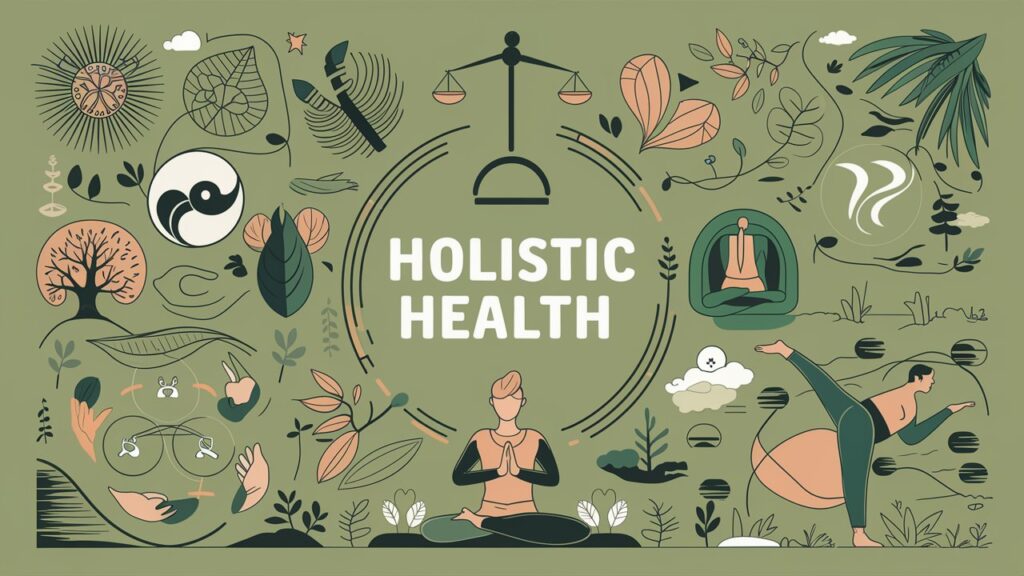
Holistic health is a growing trend for those looking to improve overall well-being. But what exactly does it entail, and how can it benefit you in real-life situations? This blog explores the holistic definition, its advantages, and practical ways to incorporate it into your daily life. By the end, you’ll have a clearer understanding of how a holistic lifestyle could positively impact you.
What is Holistic Health?
Holistic health is a concept that recognizes the importance of treating the entire person rather than focusing solely on symptoms. It’s about understanding the connections between the body, mind, and spirit and how these aspects affect your overall well-being. The holistic meaning comes from the Greek word “holos,” meaning “whole,” emphasizing that health and well-being depend on the harmony of multiple elements.

Benefits of Holistic Health
One of the most significant advantages of holistic health is its comprehensive approach. Unlike conventional treatments that might target a specific illness or issue, holistic health looks at root causes and fosters balance in all areas of life. For example, dealing with stress might include not only relaxation techniques but also dietary adjustments, exercise, and mindfulness practices to achieve long-term results.
Another advantage is the sense of self-empowerment it encourages. Rather than relying solely on healthcare professionals for solutions, individuals take a more active role in managing their health. This approach often leads to greater self-awareness, better lifestyle choices, and, in many cases, a better quality of life.
Downsides to Consider
However, holistic health is not without its challenges. Some critics argue that the non-specific nature of this approach may make it difficult to address serious medical conditions requiring immediate attention, as it typically focuses on long-term, slow progress. Additionally, navigating the various elements of holistic health can sometimes feel overwhelming, especially when trying to balance physical, mental, emotional, and spiritual health all at once.
There’s also the consideration of availability and cost. Some holistic therapies—like acupuncture, specialized diets, or consultations with naturopathic doctors—may not be covered by insurance and can be expensive. It’s essential to approach holistic health with a balanced view and understand that it works best when combined with evidence-based medical treatments.
Holistic Synonyms: Broader Understanding
To further clarify, here are a few holistic synonyms that reinforce the idea:
- Integrative Health: This term reflects combining traditional medical approaches with alternative therapies, blending both worlds for a balanced approach.
- Whole-Person Health: It emphasizes the importance of considering all aspects of an individual—body, mind, and spirit.
- Comprehensive Wellness: This highlights the all-encompassing nature of holistic health, covering every facet of well-being.
These terms reflect the core holistic definition and help expand the understanding of this approach’s philosophy.

Practical Steps to Incorporate Holistic Health
If you’re considering adopting a holistic health approach, here are some practical tips that you can start today:
1. Mindful Eating
Focusing on a balanced, whole-foods-based diet is essential in holistic health. This might include eating more fruits, vegetables, and minimally processed foods. While adopting such a diet can improve your energy and help manage weight, some people may find it challenging to maintain due to cost or convenience.
2. Regular Exercise
Exercise is a key pillar of holistic health. Whether it’s yoga, walking, swimming, or strength training, physical activity promotes not only physical health but also mental clarity and emotional balance. However, finding the right activity and committing to it regularly can be difficult for those with busy schedules.
3. Meditation and Stress Management
Holistic health emphasizes mental and emotional well-being. Practices like meditation, deep breathing, or progressive muscle relaxation are excellent ways to manage stress and improve mental health. That said, it can take time to see the benefits, and some individuals may struggle with consistency.
4. Emotional Awareness and Self-Reflection
Journaling or therapy can be beneficial tools for emotional health. Engaging in regular self-reflection can lead to better emotional resilience and coping skills. However, facing deep-seated emotions or trauma without adequate support can sometimes feel overwhelming, making professional guidance essential in such cases.
5. Spiritual Growth
Holistic health also includes spiritual well-being, whether that’s through meditation, nature immersion, or exploring spiritual texts. This area of health provides a sense of purpose and connectedness but can sometimes feel abstract or hard to prioritize in daily life.
6. Consult Holistic Practitioners
For more personalized guidance, consulting a holistic practitioner such as a naturopathic doctor or integrative nutritionist can be invaluable. While these professionals offer tailored advice, be aware that these services may not always be covered by insurance, adding to your healthcare costs.

The Bigger Picture: Is Holistic Health Right for You?
Holistic health offers many advantages, such as a balanced, proactive approach to well-being and empowerment through self-care. It promotes long-term physical and mental health, and its emphasis on lifestyle choices can lead to sustained changes in well-being.
However, it’s not a one-size-fits-all solution. For some, the slower, long-term focus might not be ideal, especially when facing acute health issues. Additionally, certain holistic treatments can be expensive or require significant time and effort to integrate into your routine.
For those who can commit to the process, holistic health can be a life-changing approach to comprehensive wellness. However, it’s essential to keep a balanced perspective and know when to combine it with conventional medical treatments for the best possible outcomes.
Additional Resources
For more detailed insights into holistic health and how to begin, websites like MindBodyGreen or The Holistic Psychologist offer further reading and practical tips.
Conclusion
Holistic health encourages a full-body approach to wellness, treating not just symptoms but the whole person. While it may require a longer-term commitment, the potential benefits of increased self-awareness, improved relationships, and a deeper connection with your own health are well worth exploring. Whether you’re starting with mindful eating, regular meditation, or seeking professional holistic guidance, embracing this philosophy can lead to significant improvements in your overall well-being.
Discover all our latest posts and insights by heading over to our blog page.

